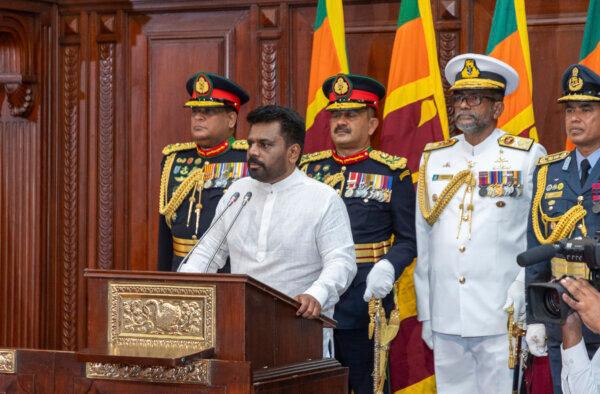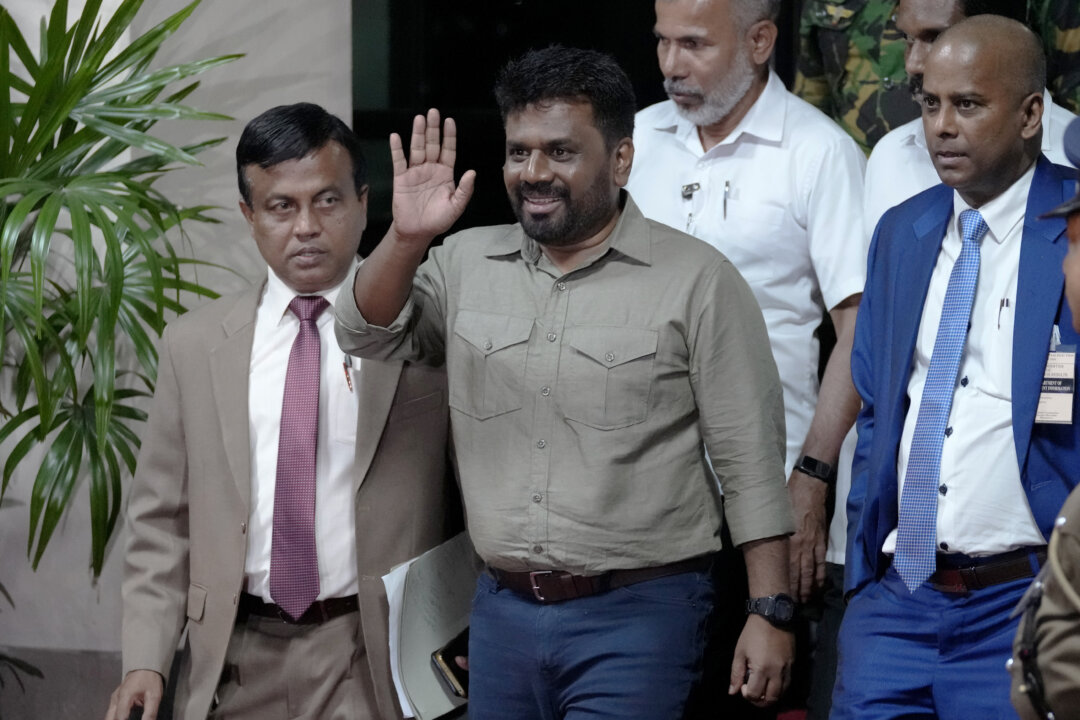Dissanayake’s coalition is led by the socialist JVP, which waged two unsuccessful armed insurrections in the 1970s and 1980s in an attempt to take power.
Anura Kumara Dissanayake, whose Marxist-leaning National People’s Power coalition won Sri Lanka’s election on Sept. 21, has been sworn in as the 10th president of Sri Lanka.
Dissanayake, 55, defeated incumbent Ranil Wickremesinghe, opposition leader Sajith Premadasa and 36 other candidates.
Wickremesinghe’s uncle J. R. Jayewardene was a former president and prime minister, Premadasa was the son of former President Ranasinghe Premadasa—who was assassinated—and another candidate was the eldest son of two-time president Mahinda Rajapaksa.
‘Family Power … Defeated’
At his final rally on Sept. 18, Dissanayake said, “There are people who think their family power will win this election, but on Sept. 21, that family power, financial power, media power, and state power will be defeated by people’s power.”
Dissayanake’s prediction came true as he received 5,740,179 votes, against 4,530,902 for his closest challenger, Premadasa.
But a map of the election results saw a stark geographical divide with the south and west of the country—the heartland of the Sinhalese majority—backing Dissayanake, while the north and east backed Premadasa, whose coalition included a party representing the Tamil minority.
The Janatha Vimukthi Peramuna (JVP), or People’s Liberation Front—which makes up the bulk of the National People’s Power coalition—is a Marxist, Sinhalese nationalist party that took part in two violent and unsuccessful uprisings in 1971 and the late 1980s.
The JVP only entered democratic politics in 1994 and has never been in power in Sri Lanka.
But the Sept. 21 election was held against the backdrop of Sri Lanka’s worst economic crisis and the political upheaval that followed it.
In July 2022, then-president Gotabaya Rajapaksa resigned and fled the country after massive protests about an economic crisis that had been unleashed by a perfect storm of political consequences.
Rajapaksa’s government borrowed huge amounts to fund projects that did not generate revenue, and then the economy was hit by the COVID-19 pandemic.
Huge Chinese Loans
Many of the loans were from China and paid for huge projects such as a new port in Hambantota, in the southern portion of the country, which happened to be the hometown of Gotabaya Rajapaksa and his brother Mahinda.
On top of that, the government used scarce foreign reserves to prop up the Sri Lankan currency, the rupee.
After Rajapaksa fled, Wickremesinghe was appointed by parliament to serve out Gotabaya Rajapaksa’s remaining term.
But Wickremagsinghe, 75, came third in the election with 17 percent of the vote.
On Sept. 23, Sri Lankan Prime Minister Dinesh Gunawardena, also 75, resigned.
Dissayanake, who is expected to appoint his own prime minister later this week, leads a coalition that includes academics, artists, lawyers, and students and promoted itself as an alternative to the “old guard” that has dominated Sri Lankan politics for years.
Dissanayake—whose only experience of government is a brief spell as agriculture and irrigation minister under then-President Chandrika Kumaratunga in the early 2000s—first ran for president in 2019.

The JVP only has three seats in parliament, but Dissayanake’s campaign succeeded, largely based on promises of tough anti-corruption measures and better welfare payments for the poor.
He wants to renegotiate a debt restructuring programme at the heart of the International Monetary Fund’s $2.9 billion bailout in 2023.
JVP’s Bloody Past
The JVP was founded in 1965 by Rohana Wijeweera—who was often photographed sporting a Che Guevara-style beret—who sought to create a socialist republic on the island of Sri Lanka.
Wijeweera was killed in 1989 when the JVP’s second insurgency was defeated by the Sri Lankan military.
Dissanayake has never commented on the JVP’s insurrections, which claimed thousands of lives.
Bhavani Fonseka, senior researcher at Colombo’s Centre for Policy Alternatives, said: “He has been in politics for a while and is not a newcomer. He is appealing to people looking for something different.
“He is a newer face and he knows how to speak to people on what they are going through.”
Between 1983 and 2009, Sri Lanka was torn apart by a violent separatist insurgency by the Tamil Tigers, who were finally defeated amid great bloodshed. The Tamil minority is largely Hindu, compared to the Buddhist Sinhalese majority.
Associated Press and Reuters contributed to this report.

